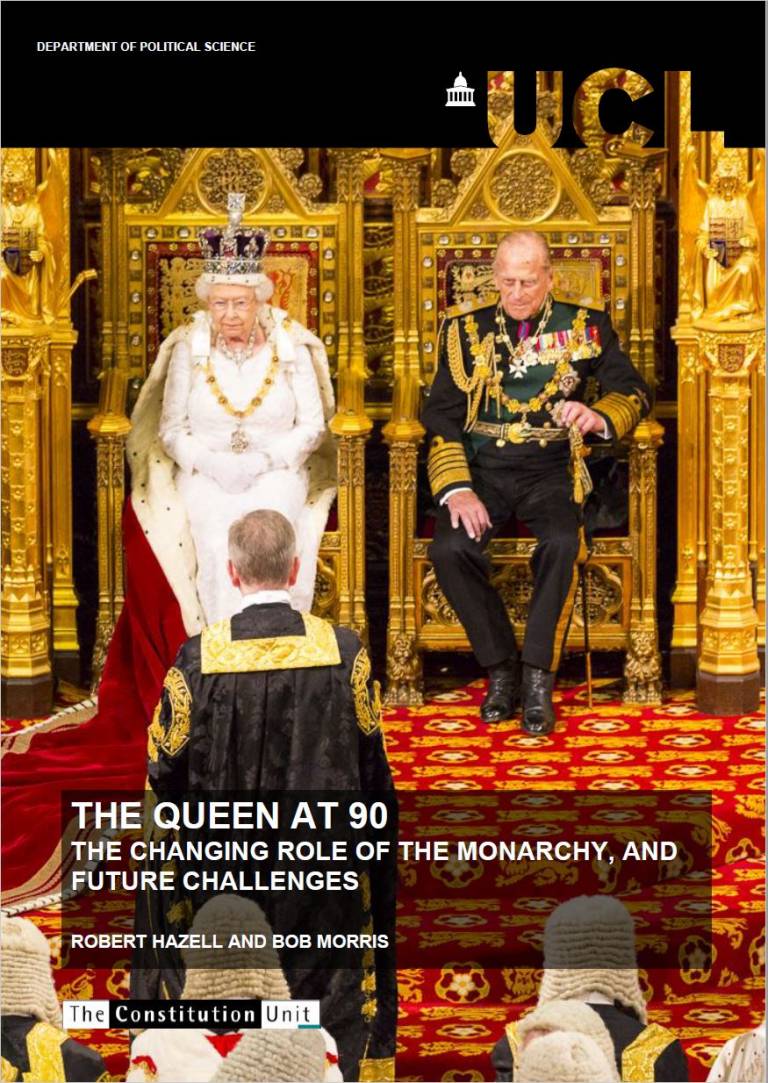Unit publishes new report on the changing role of the monarchy and future challenges
8 June 2016

The Queen at 90: What is the modern monarchy for?
To mark the official celebrations of the Queen's 90th birthday, the Constitution Unit has issued a major report which analyses the changing role and functions of the monarchy, and challenges to its future. The report finds that the Queen is left with no discretion in the exercise of her constitutional powers. But the loss of the monarchy's reserve powers has not necessarily diminished its standing; its acceptance by the political class may depend upon its powerlessness and complete neutrality. For the general public its popularity will depend upon its wider roles, in symbolising stability, continuity and national unity, and its encouragement of public and voluntary service; plus its contribution to celebrity culture.
'The Queen symbolises continuity, steadfastness and tradition in times of change', said report author Professor Robert Hazell. 'But the monarchy has changed greatly during her lifetime. Her most important constitutional powers, to choose a Prime Minister and to dissolve parliament, have been significantly curtailed. But the continuing popularity of the monarchy depends not upon its power, but its symbolic and ceremonial functions'.
'The wider functions of the monarchy have also changed', said report co-author Dr Bob Morris. 'The demands on what we call the welfare monarchy are enormous. The royal family are patrons of some 3000 charities; last year the Queen carried out 340 official engagements. Abroad, on the other hand, it will be reasonable to expect a decline in the number of Commonwealth countries - fifteen - where the Queen is also head of state.'
The report points out that while the monarch's discretion over political decision-making is effectively gone, there are some areas where confusion could arise. This applies in particular to the appointment of peers by the Prime Minister, which remains in important respects unregulated. Without more transparent regulation, excessive peerage appointments could potentially draw the monarch into controversy.
The report also discusses the future of the monarchy, in the UK and the Commonwealth:
- Whether Prince Charles succeeds the Queen as head of the Commonwealth will depend on the politics of the Commonwealth at the time, and the alternatives.
- Prince Charles's accession will also provide an occasion for the 15 realms to consider introducing their own head of state instead of a distant British monarch. The Palace has always said it would readily accept the decision of any realm to become a republic.
- Granted the pluralisation of religious belief and the growth of non-belief, Prince Charles's accession will also provide an early test of the continuing viability of the present form of monarchy's religious role, through the accession oaths (which require the new monarch to maintain Protestantism, and the Church of Scotland) and the coronation oath (which ties the monarch tightly to the Church of England).
- The monarchy risks sliding into a gerontocracy, because of their longevity. If the Queen lives as long as the Queen Mother, Prince Charles will be 80 when he becomes King. If he in turn lived to 100, Prince William would succeed at the age of 67.
- Abdication is the one issue where the monarch has a clear individual choice. No government is going to advise a monarch to abdicate because of old age; but no government is going to prevent a future monarch from doing so.
- A final threat to the monarchy is the self-sacrifice involved on the part of the monarch and those in direct line of succession. They must give lifelong service, with no prospect of retirement; and they have to abandon freedoms which we take for granted - freedom of privacy and family life, freedom of expression, freedom to travel where we like, free choice of careers, freedom of religion, freedom to marry whom we like. For the royal family these basic human rights are all curtailed.
You can download the full report here.
 Close
Close


